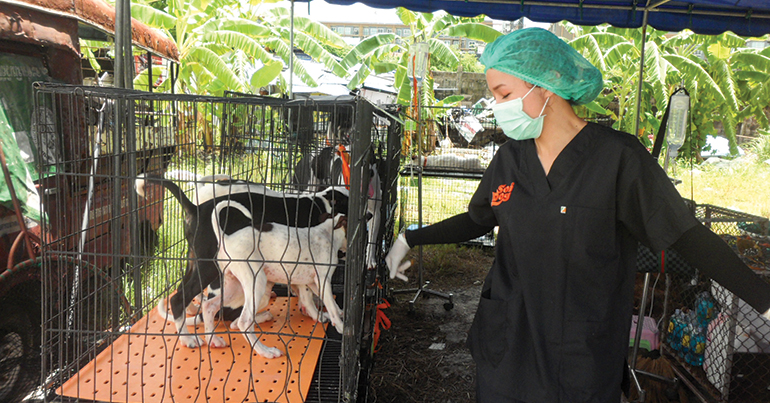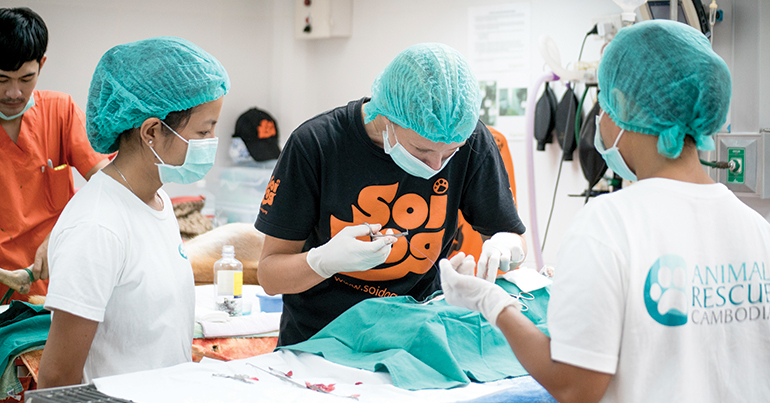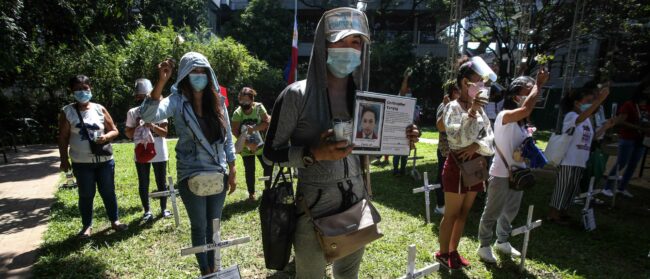Outrage erupted in Thailand in March when a Facebook video went viral of 20 dogs and puppies being poisoned in front of children on temple grounds in Nakhon Sri Thammarat province. Though euthanasia is illegal in the Buddhist country, the law makes exceptions for animals with rabies. Authorities poisoned them after a dog that had bitten three people died and was confirmed to have rabies.
It was unknown if the poisoned dogs had also been infected, and The Nation reported that other dogs in the area that had already been vaccinated against rabies had been quarantined in government shelters. Animal rights groups decried the removal of the dogs vaccinated against rabies as a threat to the “herd immunity,” or the immunity that occurs in a group when a high percentage of members have been vaccinated or exposed to a disease. They also refuted the official claim that it was being done to stop the spread of rabies – and accused the authorities of trying to wipe out stray populations.
As of 22 May, officials had confirmed nine human deaths from rabies in Thailand this year. Following this spike in reported cases in the first quarter of this year, and taking into account the 14 rabies deaths in 2017, many feared a much larger outbreak.

As Thai authorities have worked to contain the outbreak and ramp up vaccination efforts, many of the country’s animal rights activists have questioned their methods. They allege unnecessary culling and irresponsible placement of sick and healthy dogs together in overpacked shelters as the outrage and fear around Thailand’s most recent outbreak brought attention to the country’s stray-animal epidemic.
More than 2,000 of the 3,600 dogs taken to a government shelter in Nakhon Phanom province during this rabies scare have died, said John Dalley, founder of Soi Dog Foundation, which vaccinates and neuters stray animals. Just two of those quarantined dogs tested positive for rabies, with others dying from “canine diseases, starvation [and] wounds from bites”, said Dalley – exacerbated by overcrowding and the fact that healthy and sick dogs were initially kept together. More than half the dogs in quarantine had died from the highly contagious and fatal parvovirus, Narong Rattanatraiwong, the head of the Nakhon Phanom Animal Quarantine Station, told reporters.
Dalley described the shelter conditions as “appalling” during a May visit, and recently said it “would have been kinder to have humanely euthanised” the dogs rather than placing so many in a shelter that was too small and lacked the necessary staff and resources. He attributed the overcrowding to the policy of quarantining any dogs within a mile of a rabies case – even pets that would typically be monitored at home for symptoms before being surrendered. The overcrowding only got worse when the dogs, which hadn’t been separated by gender, started breeding.
Thailand is better at the national strategic policy level when it comes to managing the population of their dogs in a humane way
Thailand’s Department of Livestock Development did not respond to multiple interview requests from Southeast Asia Globe about its response to stray dogs and rabies outbreaks, but it previously released statements to the media giving assurances that it is not following a “set zero” policy of wiping out all strays, as some activists had feared.
The DLD blamed the increase in rabies cases on pet owners failing to vaccinate their pets. But then the Agriculture and Cooperatives Minister launched an investigation into how the DLD had procured the vaccines it had been using.
The probe specifically was looking into whether a company that sold the vaccines to the department for years – which is owned by the wife of a former senior official – had been selling fake or substandard vaccines. The investigation sought evidence against five DLD officials who faced “severe disciplinary actions” if found guilty, according to reporting by The Nation, but “found no evidence to prove the allegation that a former deputy director-general of the Department of Livestock Development had allowed his wife to sell vaccines to the agency improperly.”
Along with quarantining animals, the DLD has pledged to ramp up the number of (effective) vaccinations and is now cooperating with Soi Dog Foundation, which is offering veterinary assistance, basic equipment and advice on improving shelter conditions.
Out of Thailand’s estimated dog population of 8.5 million, roughly one million are free-roaming “soi” (street) dogs, a similar proportion found in countries with comparable socioeconomics, said Pankaj KC of World Animal Protection (WAP), an international animal welfare charity that works with national governments as well as the United Nations and World Health Organisation.
“Thailand is better at the national strategic policy level” compared to places like Kenya and India, but lags behind many Latin American countries “when it comes to managing the population of their dogs in a humane way”, said KC, who worked with the Thai government following the outbreak. He said that “the political willingness to address the issue of stray dogs [comes from] the highest level”, and credited Princess Chulabhorn, the youngest daughter of the late King Bhumibol, for her desire to “humanely manage the stray dog population in Thailand.”

Regarding the accusations of culling in Thailand, which WAP strongly advocates against, KC acknowledged that “rabies is the [main] reason that governments and communities use as a rationale to cull dogs, and many times the kneejerk reaction is to kill all dogs whether they have rabies or not.” Although it’s unclear whether the culling was led by the government or local communities, KC applauded local groups calling for accountability. He believes the only way to address these issues in the future is to put in place “a strong surveillance system” that identifies infected dogs, their progress and the people and animals they have interacted with. Unfortunately, he said, “Thailand is not at that stage yet.”
While the recent outbreak might not put Thailand on track for its goal to be rabies-free by 2020, the country has made huge strides in the past few decades since its record 370 deaths from rabies in 1980. Thailand’s greatest progress in this battle has been in just the past few years, said Dr. Tuntikorn Rungpatana, a veterinarian and the director of animal welfare for Soi Dog Foundation. Though he credits the government’s efforts, they fall short, he said – because the government spays and neuters animals as little as once a month in a given area, unfixed dogs have generous windows in which to mate and spread disease.
Soi Dog Foundation estimates that 600,000 stray dogs live in Bangkok, against the government’s estimate of closer to 100,000. Rungpatana said the foundation generates its estimate by multiplying the number of stray dogs found in an area by the total size of the city, while the government uses numbers based on reported dog sightings. He put the number of stray dogs closer to 200,000. Though the foundation focuses primarily on street dogs, it also offers services to pet owners who cannot afford to vaccinate or spay. Soi Dog has also developed a curriculum focused on responsible ownership and how to help and care for stray animals that is taught in ten schools in Phuket.
“The last generation had no protocol or knowledge of sterilisation,” said Rungpatana. “That’s why today the population is so overgrown. We must give [students] the knowledge of how to resolve this problem, and teach them to be ready to have a pet, not just to adopt a puppy because it is cute and then leave it at the temple.”

He was referring to the decades-long practice of Thai people abandoning their animals at temples – since, as he explained, “people understand that the monks cannot say no”. Soi Dog Foundation often places its mobile units at temples because of this practice, which puts infected animals in contact with humans and other animals.
It’s crucial to make individuals and local government accountable and to teach responsible ownership in order to “tackle the rate of abandonment at places like temples and establish the culture of adoption”, said Rungpatana.
The vet was careful to frame the issue as “dog population management” rather than “stray population control” to address the root causes of the issue and to better offer pet owners, community members and government the tools and education they need to more humanely address Thailand’s stray animal problem.
Promoting adoption remains an important solution, said Rungpatana. Part of Soi Dog’s adoption efforts include sending up to 300 dogs a year to North America, where he said they are more likely to find owners.
Rungpatana hopes that rather than seeing these dogs as either a nuisance or a temporary accessory, Thai people will become more motivated to adopt strays from shelters. Whether in the classroom or through community programmes, those advocating and offering services for Thailand’s strays hope that more education and resources will change community mindsets and help these animals be seen as pets rather than pests.
Cat cafe for a cause

A Thai-American in Bangkok is planning a novel way to raise awareness and educate her community about the stray situation: Catherine Costa plans to open a cat cafe where the community can adopt cats and learn more humane animal practices.
Harnessing Bangkok’s love of themed eateries and Instagram-worthy hangouts, she is fundraising and laying plans for the cafe, which she expects to open before the end of 2018.
“Having grown up in America, I think it’s just about the culture – I always heard growing up that you need to spay and neuter your pets and that if you see a stray animal, you need to take it to the pound to see if it’s tagged,” she told Southeast Asia Globe. “People here are not as aware of spaying and neutering, and they aren’t aware of the benefits for the animals and for themselves and their communities.” She believes the interest is there, pointing to how people care for and feed “community animals”. But the number of strays is so overwhelming – and the cost of their medical care can be so prohibitive – that the situation begins to look helpless.
Costa hopes her vegan and vegetarian cat cafe will attract influencers and social media personalities whose lifestyles and interests are emulated by young Thais. Besides encouraging adoption, she’s planning a community workspace on site. The cafe will also be one of the few spaces focusing on cats in Bangkok.
Though Thailand has a huge number of stray cats, government efforts remain focused on dogs – in large part because rabies is known as “mad dog disease” and while cats can transmit rabies, 95% of cases come from dogs. The stray cat population is also less visible since cats hide better in urban environments. Put simply, “the danger that dog/human conflict poses is bigger than the danger that cat/human conflict poses,” explained KC of World Animal Protection. This can put stray dogs, especially at the peak of a rabies epidemic, in danger of community violence.
Though they aren’t perceived as especially dangerous, stray cats are still at risk of violence from people because they can be viewed as a nuisance.
“Some businesses equate them to being rats,” said Costa. “They can defecate on rooftops and have babies in hard-to-reach places. Some are too feral to capture, and if they are in heat, they’re up calling at night.” While cats aren’t the main focus of most veterinary charities and organisations – Soi Dog Foundation sterilises cats only on Thursdays, though there’s hope to increase services as the dog population decreases – Costa still believes that spaces like her cat cafe offer a crucial opportunity to engage with communities around topics like veterinary health and responsible ownership.
Costa said community involvement will be the key to empowering people and increasing local adoption culture.


